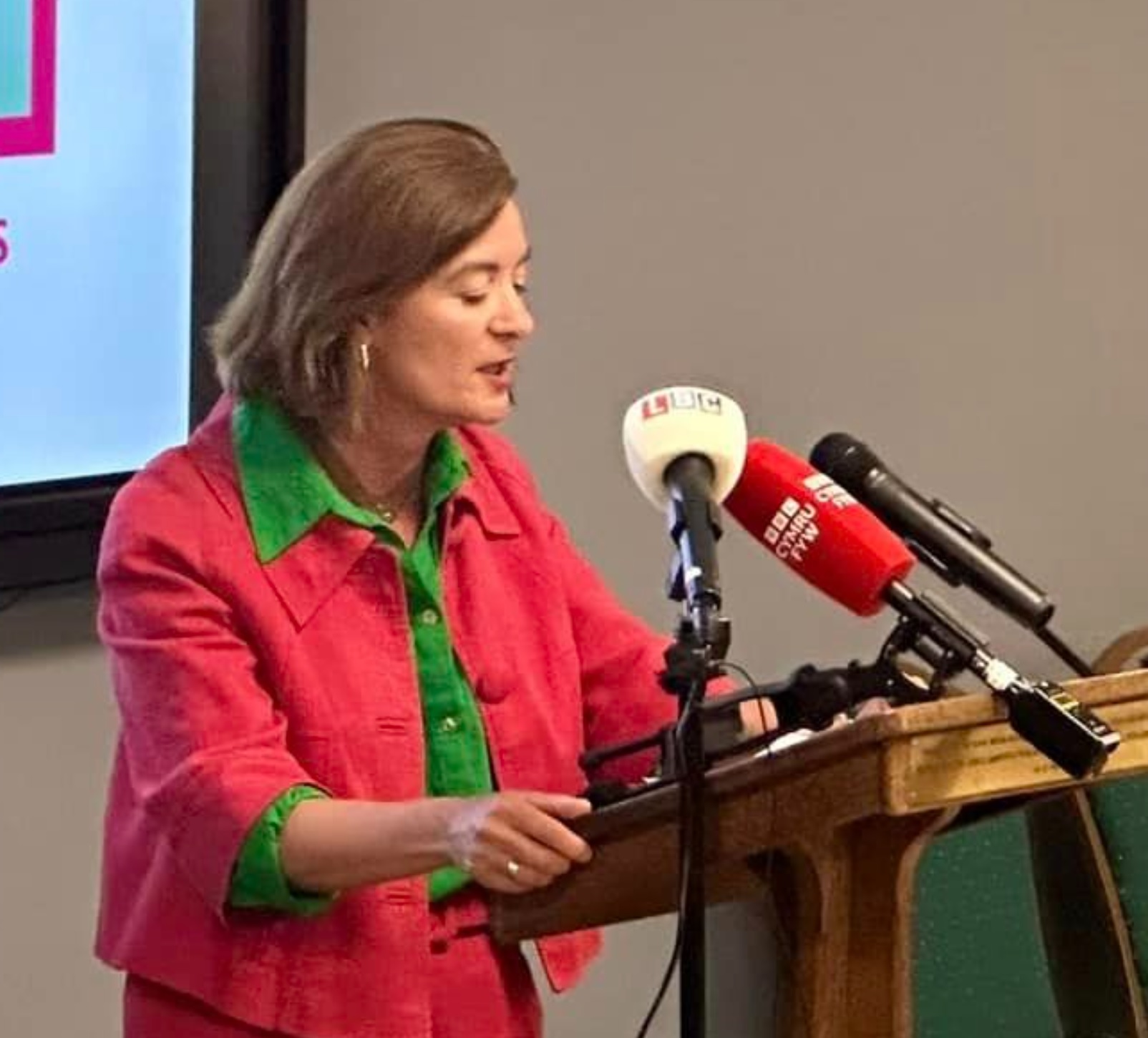Business
MP Crabb welcomes changes to ensure free access to cash at ATMs in Pembrokeshire

STEPHEN CRABB, MP for Preseli Pembrokeshire has welcomed the UK Government’s decision to ensure a legal right of free cash for millions of people. The move will mean that all including the most vulnerable in society can continue to withdraw and deposit cash for free.
The amendment to the Financial Services and Markets Bill, which is making its way through Parliament, means that the financial services regulator will have the legal power to preserve access to cash – free to consumers at the point of withdrawal or deposit – for those who need it.
The Government Minister responsible for the Bill, Andrew Griffith MP, said that whilst speed, and convenience of digital payments opens a world of opportunity for people and businesses, the reality is that so many still depend upon access to cash, particularly the elderly or those who use cash to manage their finances. This is especially true in rural parts of the country, in places like Pembrokeshire.
Following the decision, MP Crabb commented: “Pembrokeshire operates under a strong cash economy, with many people relying on free withdrawals and deposits of cash on the high street. The ability to make deposits is particularly important to support small businesses own ability to take cash.”
“Back in 2020, I wrote to the Chancellor on the need to secure access to cash, and I am pleased to see that concrete action has now been taken. I know that this change will be important for the elderly and most vulnerable in Pembrokeshire who frequently use cash as their choice of payment.”
Mr Crabb’s comments to this newspaper come the UK government has agreed to legally mandate banks to provide customers with easily accessible free cash services on high streets. This decision comes amidst a surge in bank branch closures over the past year and a continual decline in the number of free-to-use cash machines.
The reduction in access to cash or banking facilities poses challenges for individuals who rely on physical currency, particularly the elderly, affecting their ability to conduct everyday tasks such as banking and shopping.
Baroness Ros Altmann, who was instrumental in driving this legislative change and received support from Life Peers across the political spectrum, lauded the development, saying, “It is great news and about time there was recognition of the role played by cash in many people’s lives.”
According to government data, over two million individuals aged 70 and above do not have internet access, preventing them from conducting online banking and rendering them reliant on physical bank services.
Over the past 15 months, major banks have closed nearly 900 branches, leaving around 5,000 remaining. Although the number of free-to-use ATMs only declined by four percent last year, over the past five years, more than 15,000 cash machines have vanished from high streets.
Consumer group Which? emphasised that without the amendment proposed by Baroness Altmann, the objective of safeguarding access to cash through the new legislation would have been undermined, as numerous free-to-use ATMs were being closed or replaced with fee-charging machines.
Rocio Concha, Director of Policy and Advocacy at Which?, emphasised the importance of free cash access for those on lower incomes, as some fee-charging ATMs impose fees of up to £2. She stated, “We have campaigned to ensure that laws protect free access to cash and are delighted the Government agrees that people should not have to pay fees to access their own money.”
John Howells, Chief Executive of cash machine network Link, welcomed the strengthened legislation, describing it as a significant step forward. Link has already intervened to protect 3,400 free-to-use cash machines from closure and, through a partnership with banks, recommended the establishment of over 100 banking hubs in communities where all branches have been shuttered. Cash Access UK, funded by the banks, is responsible for opening these hubs, and a few have already been established, including one in Troon, South Ayrshire.
Howells emphasised the need to protect access to cash, as approximately five million people still rely on physical currency despite its declining usage.
Tulip Siddiq, the Shadow City Minister, urged the government to go further and adopt Labour’s policy of safeguarding face-to-face banking services to ensure that no individual is left without essential services.
Business
Tax deadline for self-employed and landlords as digital system goes live in April

Quarterly online reporting to become mandatory for higher earners under HMRC shake-up
MORE than 860,000 sole traders and landlords across the UK are being urged to prepare now for major changes to the way they report tax, with new digital rules coming into force in just two months.
From April 6, thousands of self-employed workers and property landlords earning over £50,000 a year will be required to keep digital records and submit quarterly income updates to HM Revenue & Customs under the Government’s Making Tax Digital scheme.
The changes form part of a wider overhaul designed to modernise the tax system and reduce errors.
Instead of submitting figures once a year, those affected will use approved software to record income and expenses throughout the year and send short quarterly summaries to HMRC. Officials stress these are not extra tax returns, but updates intended to spread the workload and avoid the usual January rush.
Free and paid software options are available, with the system automatically generating the figures needed for submission.
At the end of the tax year, users will still file a Self Assessment return, but most of the information will already be stored digitally.
Craig Ogilvie, HMRC’s Director of Making Tax Digital, said the move should make tax reporting simpler.
He said: “With two months to go until MTD for Income Tax launches, now is the time to act. The system is straightforward and helps reduce errors. Thousands have already tested it successfully.
“Spreading your tax admin throughout the year means avoiding that last-minute scramble to complete a tax return every January.”
More than 12,000 quarterly updates have already been submitted during a voluntary trial.
Phased rollout
The new rules will be introduced gradually:
• From April 2026 – those earning £50,000 or more
• From April 2027 – those earning £30,000 or more
• From April 2028 – those earning £20,000 or more
To ease the transition, HMRC says it will not issue penalty points for late quarterly submissions during the first 12 months.
After that, a points system will apply, with a £200 fine only triggered once four late submissions are reached.
Anyone unable to use digital tools for genuine reasons can apply for an exemption.
Tax agents and accountants are advising clients to prepare early to avoid last-minute problems.
Further guidance, webinars and sign-up details are available via GOV.UK.
Business
Bid to convert office space into chocolate factory, salon and laundrette

A CALL for the retrospective conversion of office space previously connected to a Pembrokeshire car hire business to a chocolate factory, a beauty salon and a laundrette has been submitted to county planners
In an application to Pembrokeshire County Council, Mr M Williams, through agent Preseli Planning Ltd, sought retrospective permission for the subdivision of an office on land off Scotchwell Cottage, Cartlett, Haverfordwest into three units forming a chocolate manufacturing, a beauty salon, and a launderette, along with associated works.
A supporting statement said planning history at the site saw a 2018 application for the refurbishment of an existing office building and a change of use from oil depot offices to a hire car office and car/van storage yard, approved back in 2019.
For the chocolate manufacturing by ‘Pembrokeshire Chocolate company,’ as part of the latest scheme it said: “The operation comprises of manufacturing of handmade bespoke flavoured chocolate bars. Historically there was an element of counter sales but this has now ceased. The business sales comprise of online orders and the delivery of produce to local stockist. There are no counter sales from the premises.”
It said the beauty salon “offers treatments, nail services and hairdressing,” operating “on an appointment only basis, with the hairdresser element also offering a mobile service”. It said the third unit of the building functions as a commercial laundrette and ironing services known as ‘West Coast Laundry,’ which “predominantly provides services to holiday cottages, hotels and care homes”.
The statement added: “Beyond the unchanged access the site has parking provision for at least 12 vehicles and a turning area. The building now forms three units which employ two persons per unit. The 12 parking spaces, therefore, provide sufficient provision for staff.
“In terms of visiting members of the public the beauty salon operates on an appointment only basis and based on its small scale can only accommodate two customers at any one time. Therefore, ample parking provision exists to visitors.
“With regard to the chocolate manufacturing and commercial laundrette service these enterprises do not attract visitors but do attract the dropping off laundry and delivery of associated inputs. Drop off and collections associated with the laundry services tend to fall in line with holiday accommodation changeover days, for example Tuesday drop off and collections on the Thursday.
“With regard to the chocolate manufacturing ingredients are delivered by couriers and movements associated with this is also estimated at 10 vehicular movements per week.”
The application will be considered by county planners at a later date.
Business
First Minister criticised after ‘Netflix’ comment on struggling high streets

Government announces 15% support package but campaigners say costs still crushing hospitality
PUBS, cafés and restaurants across Wales will receive extra business rates relief — but ministers are facing criticism after comments suggesting people staying home watching Netflix are partly to blame for struggling high streets.
The Welsh Government has announced a 15% business rates discount for around 4,400 hospitality businesses in 2026-27, backed by up to £8 million in funding.
Announcing the package, Welsh Government Finance Secretary Mark Drakeford said: “Pubs, restaurants, cafés, bars, and live music venues are at the heart of communities across Wales. We know they are facing real pressures, from rising costs to changing consumer habits.
“This additional support will help around 4,400 businesses as they adapt to these challenges.”
The announcement came hours after Eluned Morgan suggested in Senedd discussions that changing lifestyles — including more time spent at home on streaming services — were contributing to falling footfall in town centres.
The remarks prompted political backlash.
Leader of the Welsh Liberal Democrats, Jane Dodds, said: “People are not willingly choosing Netflix over the high street. They are being forced indoors because prices keep rising and wages are not.
“Blaming people for staying at home is an insult to business owners who are working longer hours just to survive.”
Industry groups say the problem runs deeper than consumer behaviour.
The Campaign for Real Ale (CAMRA) welcomed the discount but warned it would not prevent closures.
Chris Charters, CAMRA Wales director, said: “15% off for a year is only the start. It won’t fix the unfair business rates system our pubs are being crushed by.
“Welsh publicans need a permanent solution, or doors will continue to close.”
Across Pembrokeshire, traders have repeatedly told The Herald that rising energy bills, wage pressures and rates — rather than a lack of willingness to go out — are keeping customers away.
Several town centres have seen growing numbers of empty units over the past year, with independent shops and hospitality venues reporting reduced footfall outside the main tourist season.
While ministers say the relief balances support with tight public finances, business groups are calling for wider and longer-term reform.
Further debate on rates changes is expected later this year.

-

 Crime2 days ago
Crime2 days agoSex offender jailed after living off grid in Pembrokeshire and refusing to register
-

 Health20 hours ago
Health20 hours agoHealth board targets rise in steroid and gym drug use across west Wales
-

 News3 days ago
News3 days agoPrincess of Wales visits historic Pembrokeshire woollen mill
-

 Crime7 days ago
Crime7 days agoPembroke man accused of child sex offences sent to Swansea Crown Court
-

 Health5 days ago
Health5 days agoDoctor struck off after sexual misconduct findings at Withybush Hospital
-

 Crime22 hours ago
Crime22 hours agoTeacher injured and teenager arrested for attempted murder at Milford Haven School
-

 News5 days ago
News5 days agoHerald journalists to feature in true-crime documentary on local lockdown murder
-

 Community7 days ago
Community7 days ago50s women threaten legal action over pension compensation refusal
























